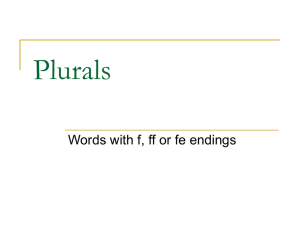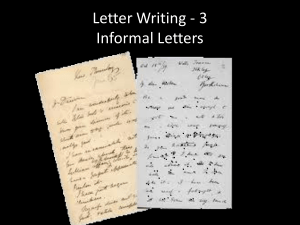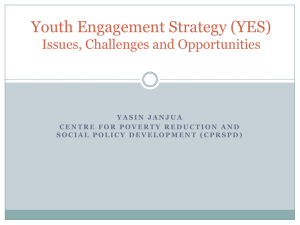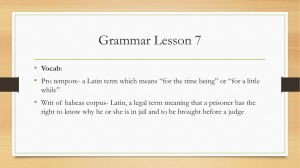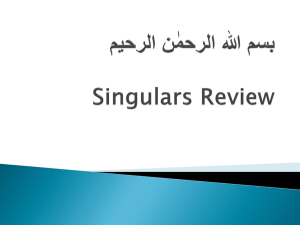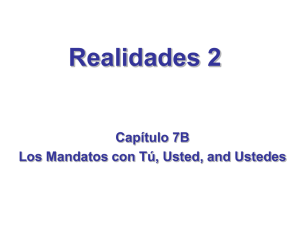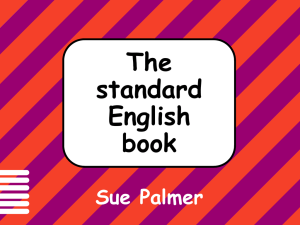Morphology
advertisement
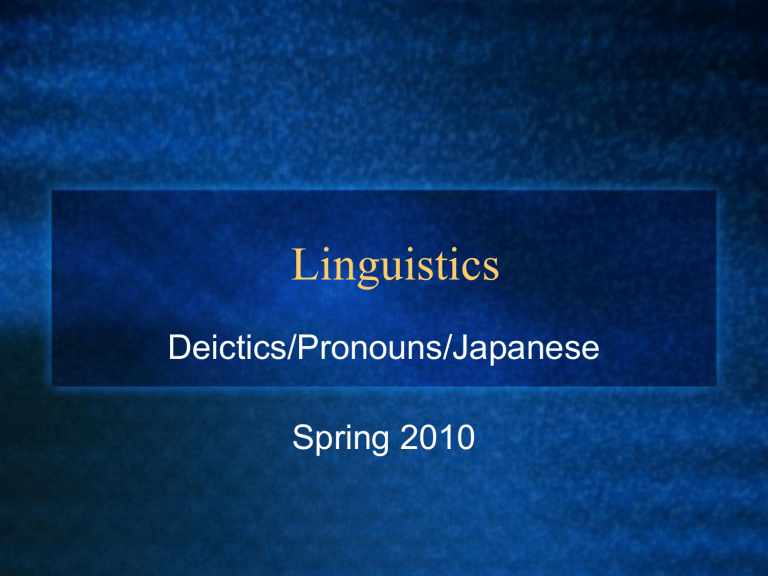
Linguistics Deictics/Pronouns/Japanese Spring 2010 There’s me & there’s you …& then there are you. How do we talk about you? Which one of you do we mean? Can we be nice to you? Does it matter who you are? How is ‘you’ realized? Here you are – English 2nd person Steve Singular: Informal Formal you you Plural: Informal Formal you you Here you are again Steve All y’all Singular: Informal Formal you you _____ _____ Plural: Informal Formal you you _____ _____ You – in the North Way Nynorsk Bokmal Singular: Informal Formal du De du De Plural: Informal Formal de De dere De You – Iberian Style Spanish Am Span Singular: Informal Formal tu usted tu/vos/usted usted Plural: Informal vosotros/as ustedes vosotros/as ustedes Formal ustedes Arabic (No T-V distinction) Standard Egyptian أنت أنت inta/inti حضرتك حضرتك hadret-ak/-ik أنتم أنتن antum/ antunna ‘antumaa’ = dual m/f حضرتك حضرتك hadretkum Singular: Male Female Plural: Male Female Japanese 1st person Sg. Watashi 2nd p Anata 3rd p Kare/ Kanojo Pl. A-tachi K-tachi W-tachi Thus, J is very easy & reasonable… Japanese – 1st p sg: morphs ‘watashi’ 私 – わたし Reduced from ‘watakushi’ 私 - わたくし Often ‘reduced’ to: ‘wadasu’ わだす (東北訛り - men) ‘washi’ わし old men ‘wai,wate,ate’ わい、わて、あて men ‘wa’ わ (青森: m/f; 愛媛: 年配の男性/二人称) ‘wan, wa-’ ワン、ワー (沖縄方言 -men) ‘atashi’ あたし young women ‘atai’ あたい women very informal Germanic ‘morphs’ English Deutsch Dutch Dansk Svensk Norsk Icelandic Old English I Ich Ik Jeg Jag Jeg/Eg Ég Ic English ‘reduced’ Think of variations in the pronunciation of I. Meanwhile, in Japan: more of I 我 われ ‘ware’ Duplicated very formal plural (casual) 我が わが ‘waga’ very formal Means "my" or "our". Used in speeches and formalities; 我が社 wagasha (our company) or 我が国 wagakuni (our country). Meanwhile: I…part II ‘ore’ 俺 (おれ) casual; male Prev. m/f & 上下; now male & =/下 ‘oira’ 俺ら (おいら) (北) male ‘oi/oidon’ おい/おいどん (南九州) m ‘ura’ うら (東海東山) m/f ‘orecchi’ おれっち (pl sg) ‘oryaa/oraa’ おりゃあ / おらぁ …’-aa’ III ‘oryaa, oraa, bokaa, watashya, atashya, washyaa,’ おりゃあ、おらぁ, ぼかぁ、わたしゃ、あたし ゃ、わしゃあ Chibi-mariko-chan (ちびまる子ちゃん) – a popular cartoon character’s speech By extending the ‘aa’ or ‘ya’ sound, your 1st person sg mimics Chibimariko Deictic Flexibility & ミ 1st person often used as 2nd What are we ‘pointing’ to? Cf. “I’ll come over” ミー ‘me,’ pronounced in a Japanese manner is not used in daily life but in fiction it might be used by a character with an international outlook. 最近では 未成年の女子などが使用している。 ミ, too In the early ‘80s, a pro wrestler took on two stage personalities; in one he used ‘ore’ and in the other ‘me’ as his 1st person singular. (no word on the plural) 1980年代初頭に連載された梶原一騎「プ ロレススーパースター列伝」では、ブッチャ ーの一人称を、主人公となるブッチャー篇 では「俺」、陽気な脇役であるタイガーマス ク篇では「ミー」と使い分けている。 More of me ‘uchi’ 家 informal - young girls ‘boku’ 僕 informal - m (rarely f) ‘jibun’* 自分 athletics/2nd p. ‘your name+diminutive’ - w/ children ‘shoushoku’ 小職 - in business ‘sensei’ 先生 - w/ teacher/doctor ‘hongan’ 本官/ - in court ‘kochira’ こちら– in business dealings SgPl: choices - 達 ‘-tachi’ informal. m/f examples: 私達 ‘watashi-tachi’/ ‘watakushi-tachi’/ ‘atashi-tachi’ 僕達 ‘boku-tachi’ 俺達 ‘ore-tachi’ Also can be attached to names to indicate that person and the group (s)he is with (Ryuichi-tachi = Ryuichi and friends). Pronoun + plural 共 ‘–domo’ humble –m/f 私 共 ‘watashi-domo’ ‘watakushi-domo’ *‘washi-domo’ 僕 共 *‘boku-domo’ 俺 共 *’ore-domo’ Pronoun + plural 等 ‘–ra’ informal Used with informal pronouns; often used with hostile language 私 等 ‘watashi-ra’ *‘watakushi-ra’ ‘atashi-ra’(?) ‘washi-ra’ 僕 等 ‘boku-ra’ 俺 等 ‘ore-ra’
